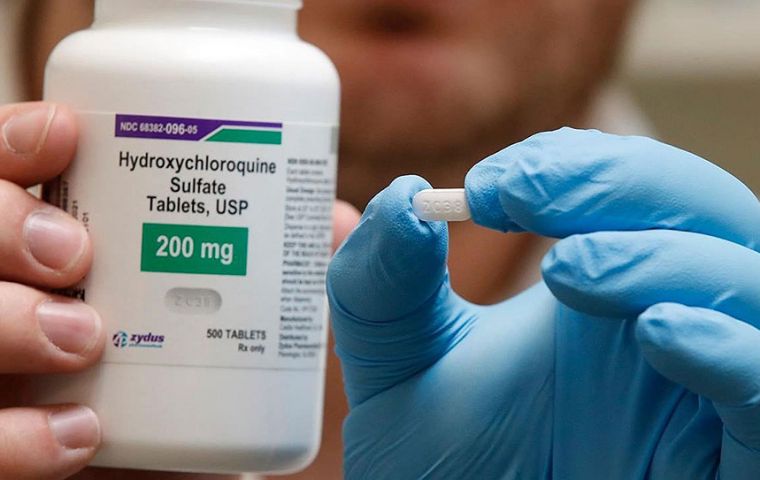MercoPress. South Atlantic News Agency
Leading medical publications involved in major scientific “blooper” regarding hydroxychloroquine
 The Lancet medical journal pulled the hydroxychloroquine study after three of its authors retracted it, citing concerns about the quality and veracity of data in it
The Lancet medical journal pulled the hydroxychloroquine study after three of its authors retracted it, citing concerns about the quality and veracity of data in it An influential study that found hydroxychloroquine increased the risk of death in COVID-19 patients has been withdrawn a week after it led to major trials being halted, adding to the confusion about a malaria drug championed by U.S. President Donald Trump.
The Lancet medical journal pulled the study after three of its authors retracted it, citing concerns about the quality and veracity of data in it. The World Health Organization will resume its hydroxychloroquine trials after pausing them in the wake of the study. Dozens of other trials have resumed or are in process.
The three authors said Surgisphere, the company that provided the data, would not transfer the dataset for an independent review and they “can no longer vouch for the veracity of the primary data sources.”
The fourth author of the study, Dr. Sapan Desai, chief executive of Surgisphere, declined to comment on the retraction.
The Lancet said it “takes issues of scientific integrity extremely seriously” adding: “There are many outstanding questions about Surgisphere and the data that were allegedly included in this study”.
Another study in the New England Journal of Medicine (NEJM) that used Surgisphere data and shared the same lead author, Harvard Medical School Professor Mandeep Mehra, was retracted for the same reason.
The Lancet said reviews of Surgisphere’s research collaborations were urgently needed.
The race to understand and treat the new coronavirus causing the COVID-19 pandemic has accelerated the pace of research and peer-reviewed scientific journals are go-to sources of information for doctors, policymakers and lay people alike.
Chris Chambers, a professor of psychology and an expert at the UK Center for Open Science, said The Lancet and the NEJM - which he described as “ostensibly two of the world’s most prestigious medical journals” - should investigate how the studies got through peer review and editorial checks.
“The failure to resolve such basic concerns about the data” raises “serious questions about the standard of editing” and about the process of peer review, he said.
The observational study published in The Lancet on May 22 said it looked at 96,000 hospitalized COVID-19 patients, some treated with the decades-old malaria drug. It claimed that those treated with hydroxychloroquine or the related chloroquine had higher risk of death and heart rhythm problems than patients who were not given the medicines.
“I did not do enough to ensure that the data source was appropriate for this use,” the study’s lead author, Professor Mehra, said in a statement. “For that, and for all the disruptions – both directly and indirectly – I am truly sorry.”




Top Comments
Disclaimer & comment rulesCommenting for this story is now closed.
If you have a Facebook account, become a fan and comment on our Facebook Page!